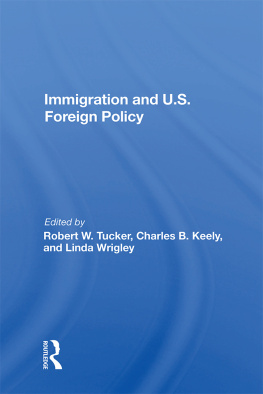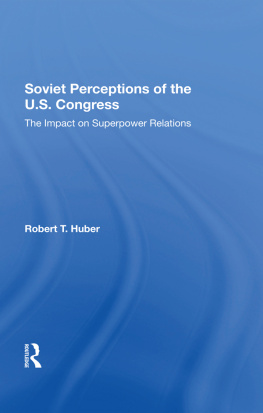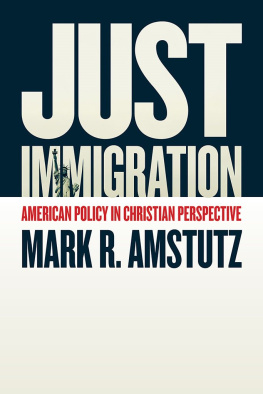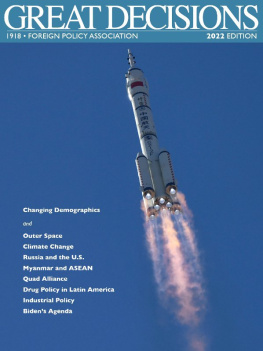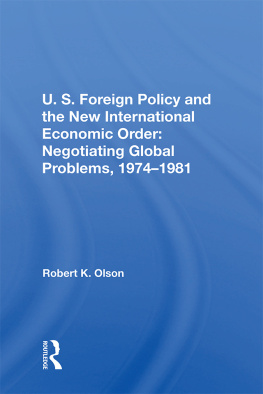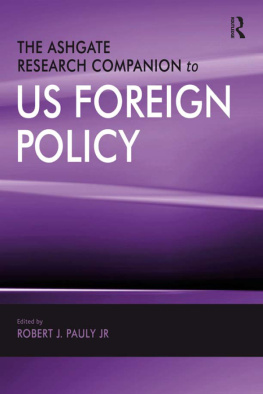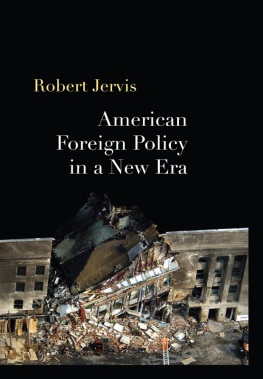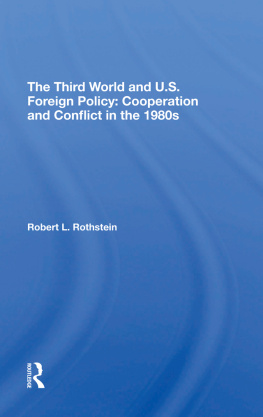Immigration and U.S. Foreign Policy
The chapters in this book were prepared under the auspices of the Lehrman Institute, New York City, with funding from the Ford Foundation.
Immigration and U.S. Foreign Policy
Edited By
Robert W. Tucker , Charles B. Keely , and Linda Wrigley
First published 1990 by Westview Press, Inc.
Published 2018 by Routledge
52 Vanderbilt Avenue, New York, NY 10017
2 Park Square, Milton Park, Abingdon, Oxon OX14 4RN
Routledge is an imprint of the Taylor & Francis Group, an informa business
Copyright 1990 Taylor & Francis
All rights reserved. No part of this book may be reprinted or reproduced or utilised in any form or by any electronic, mechanical, or other means, now known or hereafter invented, including photocopying and recording, or in any information storage or retrieval system, without permission in writing from the publishers.
Notice:
Product or corporate names may be trademarks or registered trademarks, and are used only for identification and explanation without intent to infringe.
Library of Congress Cataloging-in-Publication Data
Immigration and U.S. foreign policy/edited by Robert W. Tucker,
Charles B. Keely, and Linda Wrigley.
p. cm.
Includes bibliographical references.
ISBN 0-8133-7853-2
1. United StatesEmigration and immigrationGovernment policy.
2. RefugeesGovernment policyUnited States. 3. United States
Foreign relations. I. Tucker, Robert W. II. Keely, Charles B.
III. Wrigley, Linda. IV. Title: Immigration and US foreign policy.
JV6493.153 1990
325.73dc20 89-27486
CIP
ISBN 13: 978-0-367-01359-2 (hbk)
Contents
, Robert W. Tucker
, Nathan Glazer
, Oscar Handlin
, Charles B. Keely
, Manfred Jonas
, Ellen Percy Kraly
, Aristide R. Zolberg
, Robert L. Bach
, Jorge I. Domnguez
, Linda W. Gordon
, Myron Weiner
In the making of foreign policy it is the rule that the urgent drives out the important. So it is with the study of foreign policy as well. Scholars tend to focus on issues of immediate concernthe latest weapon, the ongoing negotiation, the unstable country, the point of potential confrontation. All too seldom do they address the long-term trends that will ultimately shape the foreign policy of the United States. Of course long-term trends are often elusive, difficult to predict, pin down, and assess. There is, however, one trend, certain to influence U.S. foreign policy in the twenty-first century, about which considerable statistical information is available but that has received much too little attention. The trend is the changing character of the nation's population due to immigration. In recent years the problem of population growth the world over has been the subject of considerable study. Important though population growth undoubtedly is, population movements across international boundaries may well have a greater bearing on U.S. relations with other countries.
Despite the considerable change occurring in the ethnic composition of the United States, there has been little attention directed to the consequences of this change for the nation's foreign policy. That immigration does affect our foreign relations we know from experience. The great waves of immigration of the past, beginning in the mid-nineteenth century, did have bearing on the course of U.S. foreign policy. There is in fact a body of scholarly writing that argues that the policy of isolationism in the interwar period was primarily the result of the ethnic composition of the United States at that time. Although recent immigrants and their children will form a smaller proportion of the nation's population in the years ahead than they did in the last half of the nineteenth century and the first half of the twentieth, their impact on foreign policy is ultimately beholden to the democratic process; the composition of the demosthe populationwill inevitably affect policy in the future as it has in the past, the only question being how. There is, moreover, the obvious consideration that because the United States is the largest receiver of immigrants in the world, U.S. immigration policy is and will likely remain of marked interest to other countries and their citizens. Any U.S. policy will please some governments while displeasing others. Finally, U.S. refugee policy decisions also have a significant foreign policy dimension because the United States has been and remains a leader in global refugee policy and program initiatives, especially funding and resettlement.
Written by demographers, historians, and political scientists, this volume is composed of chapters that are concerned with the relationship of immigration and foreign policypast, present, and future. It was prepared under the auspices of the Lehrman Institute, New York City, with funding from the Ford Foundation.
Robert W. Tucker
Charles B. Keely
Linda Wrigley
1
Immigration and Foreign Policy: General Considerations
Robert W. Tucker
The United States is in the midst of the second great immigration in its history. In the course of the 1980s, between 8 and 9 million immigrants are expected to enter the United States, whether legally or illegally, a number about 50 percent larger than that of the 1970s and far greater than that of any decade since World War I. Despite recent declines in legal and illegal entries, the expectation is that these numbers will persist and possibly go even higher, notwithstanding a marked public preference for imposing more restrictive limits on immigration. Given the decline in the nation's birth rate, immigration is likely to become the principal source of labor in a market that may require substantial outside supply if its demands are to be met. More important, however, is the prospect that the population of the countries making up the Caribbean basin will double in the period between 1980 and 2010. The inability of these countries to provide employment for a rapidly expanding work force can only lead to one result: The pressure of those seeking to enter the United States is almost certain to increase.
The changed composition of the present immigration must be added to these considerations. Historically, Europe was the source of nearly all immigrants admitted to the United States. Until World War I, it provided almost 9 out of every 10 of the nation's immigrants, with Latin America and Asia seldom contributing more than 8 percent. Today, these proportions are almost exactly reversed, with Europe providing roughly 10 percent of immigrants and Asia and Latin America making up almost 85 percent of the total. And it is unlikely that these proportions will change markedly in the foreseeable future. Although it is expected that the rapid rise in Asian immigration relative to Latin American immigration will decline, the predominance of Latin America and Asia as the principal sources of future immigrants is expected to persist.
What will be the long-term effects of this second great immigration on the nation's foreign policy? This is not the only question raised by the relationship between immigration and foreign policy, though it is the one that is of primary interest here. Immigration policy may affect the attitudes and foreign policies of other states, as the cases of Japan and, more recently, Mexico testify. If the United States has traditionally dealt with immigration issues almost entirely on the basis of domestic considerations, this, in part, has reflected the conviction that a foreign policy of isolation had no need to take the interests and sensibilities of other countries into serious consideration. Then, too, the dogma that the regulation of immigration was solely the prerogative of the sovereign state went unquestioned. In consequence, the tradition of unilateralism with respect to immigration was, if anything, even more pronounced than it was in U.S. foreign policy generally. Only since the early 1960s has this way of viewing immigration policy begun to change and immigration been employed as an instrument of foreign policy. Even so, the change has been modest, limited in area and uncertain in application.


